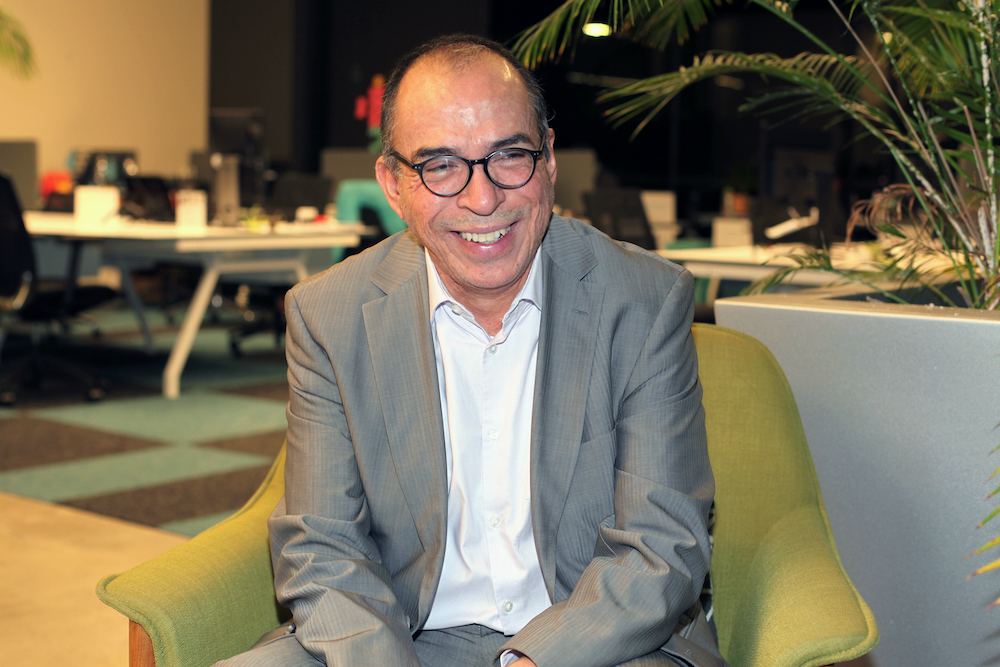
Photo by Aaron Salcido.
Alfredo Corchado is the U.S.-Mexico border correspondent for the Dallas Morning News. His latest book, Homelands: Four Friends, Two Countries, and the Fate of the Great Mexican-American Migration, traces Mexican immigration to the United States over the last three decades. Before joining a November 2019 Zócalo event titled “What Can Life on the U.S.-Mexico Border Teach America?” and held at Cross Campus in downtown Los Angeles, Corchado spoke in the green room about the late entertainment icon Juan Gabriel, how he decompresses, and why the border holds the answer to many of the United States’ divisions.
We heard that before you wanted to be a reporter, you wanted to be a songwriter. What kind of songs did you want to write?
The most romantic songs ever.
Oh my gosh. Were you in love?
I was in love with—back in California, in the Central Valley—the fields of California. So I was inspired to be a songwriter. And there was a guy named Juan Gabriel, who was from the border. And I consider the border my home. So, there was a lot of connection. And I realized that I could maybe write a song, but I couldn’t sing. So, I went back to journalism.
So another type of storytelling. An easier question: What did you have for breakfast today?
A very expensive burrito. I think it was like $15–$19 if you got avocado with it.
Was it a good burrito?
It was pretty good. Not from the border, but it was pretty good. The cook was probably from the border.
What do you do to decompress?
Not enough. I try to watch movies.
Do you have any favorites?
Love Actually.
What was the most important year of your life?
Probably ’77, when I left California and moved to El Paso. It was sort of a reinvention. I left the fields. I was a high school dropout, and I went to El Paso as kind of new beginning.
What was the last thing that inspired you?
This is very depressing, but I think, in the middle of the chaos in El Paso after the [August 2019 mass] shooting, I think it inspired me to—I get kind of emotional thinking about it—but I think I was inspired by the whole idea that we’re immigrants, and that it’s up to us to sort of keep that spirit alive. I mean there was a kid who came in to shoot Mexicans. And I think going to all these funerals, talking to all these victims, in the middle of a tragedy, you find a sense of inspiration.
What’s your favorite season?
Fall. I spent some time in the East Coast, and I think I really learned to love the fall. And it just kind of sets you up for the whole holiday spirit. Again, you know, the end of a year. You start thinking of the new year, and you’re drinking hot chocolate.
What are you reading right now?
Black Klansman by Ron Stallworth. I like it a lot. I watched the movie. I had the book a long time. And I guess after the shooting I wanted to understand, you know, hatred, and racism, and so I picked up the book, and I’m deep into it.
What recent story are you most proud to have reported?
I’m always proud of the last story in a way. But I think the El Paso shooting was really significant. I did a story for a magazine, and it was about that day, what happened that day. And I read it to my parents because they inspired me. And they were very touched.
What keeps you up at night?
The idea that I won’t meet deadline. Or the idea that I didn’t get enough in that last interview, and I should have asked that question, I should have asked that question.
What’s one thing that the average person should know about the U.S.-Mexico border?
That in many ways we are a lesson for this country’s divisions, polarization. I mean, we are the answer to a lot of the questions about getting along, and intolerance, and diversity, and also the ideals of this country. It’s a spot where you can kind of learn how to get by, how to move forward.



